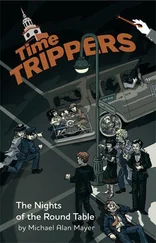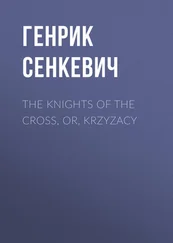William Frost - The Knights of the Round Table
Здесь есть возможность читать онлайн «William Frost - The Knights of the Round Table» — ознакомительный отрывок электронной книги совершенно бесплатно, а после прочтения отрывка купить полную версию. В некоторых случаях можно слушать аудио, скачать через торрент в формате fb2 и присутствует краткое содержание. Жанр: foreign_antique, foreign_prose, на английском языке. Описание произведения, (предисловие) а так же отзывы посетителей доступны на портале библиотеки ЛибКат.
- Название:The Knights of the Round Table
- Автор:
- Жанр:
- Год:неизвестен
- ISBN:нет данных
- Рейтинг книги:3 / 5. Голосов: 1
-
Избранное:Добавить в избранное
- Отзывы:
-
Ваша оценка:
- 60
- 1
- 2
- 3
- 4
- 5
The Knights of the Round Table: краткое содержание, описание и аннотация
Предлагаем к чтению аннотацию, описание, краткое содержание или предисловие (зависит от того, что написал сам автор книги «The Knights of the Round Table»). Если вы не нашли необходимую информацию о книге — напишите в комментариях, мы постараемся отыскать её.
The Knights of the Round Table — читать онлайн ознакомительный отрывок
Ниже представлен текст книги, разбитый по страницам. Система сохранения места последней прочитанной страницы, позволяет с удобством читать онлайн бесплатно книгу «The Knights of the Round Table», без необходимости каждый раз заново искать на чём Вы остановились. Поставьте закладку, и сможете в любой момент перейти на страницу, на которой закончили чтение.
Интервал:
Закладка:
"And the King answered: 'Gawain, you are still among the best of my knights. You failed a little at last, but it was no coward and no false knight who went up there to seek his death and to keep a promise that he need not have kept. Wear your girdle, but it shall be no shame to you. And that it may be none all my knights shall wear girdles of green lace like it.
"So the story says that all of King Arthur's knights wore green lace girdles in honor of Gawain. I don't know what became of the girdles afterwards, but they cannot have worn them always, or at least Gawain cannot have worn his. For you know he could never be wounded while he had it on, and he certainly was wounded afterwards. But I will tell you about that when I get to it."
About the time that we got to the end of this story we came to a place which the driver said was as far from Glastonbury as he had ever been in this direction. We stopped at a little inn by the road, and the driver asked the way to Queen Camel. We also asked the man who told him if he had ever heard of a hill or of any sort of place about here called Camelot, but he never had. So we went on to find it for ourselves. After more riding and more asking of the way and more showers, we came to Queen Camel. It was past luncheon-time then, and, what was more to the point, it was past the horse's luncheon-time. So we decided that we would not go any farther till we had all had something to eat.
The Bell looked like the best hotel in the place, so we went there and astonished the proprietor and all the servants by asking for something to eat. But we got it, and while we were at luncheon the driver put the horse in the stable and then talked with the proprietor, to find out whether he knew anything about Camelot. Now the keeper of this bit of an hotel must have been a remarkably intelligent man, for he really did know something about it. He came in to see us and he said that he thought that it must be Cadbury Castle that we were looking for. Then a great light shone upon me and I remembered what I ought to have remembered before, that one of my books at home had said that it was called Cadbury Castle now. "But do they not call it Camelot too?" I asked him. I did not like to give up that name.
"Oh, yes, sir," he said, "they call it Camelot too."
"And do they say that King Arthur lived there?"
"No, sir, he didn't live there; he placed his army there."
Then the landlord went away and came back with a big book, a history of Somersetshire, or something of that sort, to show us what it had to say about Cadbury Castle. It did not say much that I did not know before, but it said enough to prove what I wanted to know most of all. And that was that this Cadbury Castle was without any doubt the place that we were looking for. We finished our luncheon, the landlord showed us our way, and we went on again.
It was only a little way now. We were to find a steep road that led up the side of the hill to Cadbury Castle. It was too steep, we were told, to take our carriage up, and we should have to leave it at the bottom and walk. And so it proved. We found the hill and the steep little track up its side. We got down from the carriage, and, while we waited for the driver to find a safe place to leave the horse, we gazed up the hill, along the rough little road, and knew that at last we were before the gates of Camelot.
CHAPTER III
We walked up the steep road, and just before we came to the top of the hill the rain began again. There was one little house near the top and we decided to let Camelot wait for a few minutes longer and go into the house and stay till the rain stopped.
The woman of the house seemed to be glad to see us, and she asked us to write our names in her visitors' book. The names and the dates in the book showed that Camelot had some six or eight visitors a year. Of course we tried to get the woman to tell us something about the place, and of course we failed. She knew that it was called Cadbury Castle and sometimes Camelot and sometimes the Camp. She knew that the well close by her house was called King Arthur's Well, but she did not know why. The water in it was not good to drink, and in dry times they could not get water from it at all. She got drinking-water and in dry times all the water that she used from St. Anne's Wishing Well, a quarter of a mile around the hill. She did not know what that name meant either. She used to have a book that told all about the place, but she couldn't show it to us, because it had been lent to somebody and had never been returned. The vicar had studied a good deal about the place too, and he knew all about it. Could we find the vicar and get him to tell us about it? Oh, no, it wasn't the present vicar, it was the old vicar, and he was dead.
So we gave up learning anything and waited for the rain to stop, and then went out to see as much as we could for ourselves. The hilltop was broad and level. I can't tell just how broad, because I am no judge of acres, but I believe it was several. It had a low wall of earth around it, covered with grass, of course, like all the rest of the place. When we stood on the top of this wall and looked down, we saw that the ground sloped away from us till it made a sort of ditch, and then rose again and made another earth wall, a little way down the hillside. Then it did the same thing again, and yet once more. So in its time this hilltop must have had four strong walls around it. It really looked much more like a fort or camp than like a city. It seemed too small for a city, though it might have been a pretty big camp. If we had been looking for hard facts, I think we should have believed what the hotel-keeper had said, that this was not where King Arthur lived, but where he placed his army.
I remembered reading somewhere that the Britons and the Romans and the Saxons had all held this place at different times. I had read, too, I was sure, that parts of old walls, of a dusky blue stone, and old coins had been found here. It was a fine place for a camp or a castle. It was so high and breezy and we could see for so many miles across the country, that we could understand how useful and pleasant it must have been for either or for both. It was pleasant enough now, this broad, grassy hilltop, with its four grassy walls and the woodland sloping away from it all around. But nobody lived here now to enjoy it – nobody, that is to say, but the rabbits. For the place is theirs now, and they dig holes in the ground and make their houses where King Arthur's castle stood, where he and his knights sat in the hall about the Round Table, and where all the greatest of the world came to see all that was richest and noblest and best for kings and knights to be and to enjoy.
The rabbits scuttled across our way, as we walked about, and leaped into their holes, when we came near, and then looked timidly out again, when we had gone past, and wondered what we were doing and what right we had here in their Camelot. There were only these holes now, where once there were palaces and churches, and no traces of old glories, but the walls of earth and turf. Yet it seemed better to me that Camelot should be left alone and forgotten, like this, the city and the fortress of the rabbits, but still high and open and fresh and free, than that it should be a poor little town, full of poor little people, like Camelford. Helen said that she thought so too, when I asked her, and she was willing that this should be Camelot, if I thought that it really was.
"Really and truly and honestly," I said, "I think that this is as likely to have been Camelot as any place that we have seen or shall see. It is lucky for us that we know more about it than the people who live about here do. If we did not I am afraid it would not interest us much. I think that I have read somewhere that the King and his knights were still here on the hilltop, kept here and made invisible by some enchantment, that at certain times they could be seen, and that some people had really seen them. I don't believe this story, but while we are here let us believe at least, with all our might, that we are really and truly in Camelot.
Читать дальшеИнтервал:
Закладка:
Похожие книги на «The Knights of the Round Table»
Представляем Вашему вниманию похожие книги на «The Knights of the Round Table» списком для выбора. Мы отобрали схожую по названию и смыслу литературу в надежде предоставить читателям больше вариантов отыскать новые, интересные, ещё непрочитанные произведения.
Обсуждение, отзывы о книге «The Knights of the Round Table» и просто собственные мнения читателей. Оставьте ваши комментарии, напишите, что Вы думаете о произведении, его смысле или главных героях. Укажите что конкретно понравилось, а что нет, и почему Вы так считаете.












